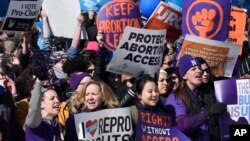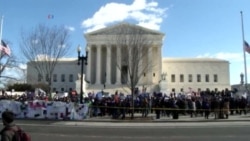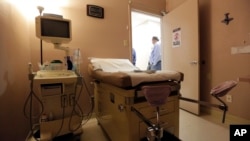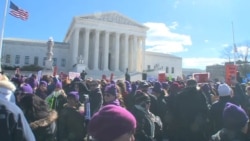The U.S. Supreme Court appeared sharply divided Wednesday as it heard arguments about the country's biggest abortion rights case in nearly a quarter-century, a dispute that could change the constitutional rights for the procedure and affect huge numbers of women.
In 90 minutes of intense arguments, the court's four liberal justices signaled that they believe abortion regulations adopted by the southwestern state of Texas are an unconstitutional curb on women's rights that would lead to the closure of more abortion clinics in the country's second-biggest state. But the court's conservative justices said there is little evidence that the law has forced the closure of clinics or will lead to still fewer abortion centers in Texas.
Left uncertain was the crucial vote of Justice Anthony Kennedy, who suggested that lower courts might need to hear more evidence in the case and wondered whether the state's 2013 law was responsible for the closing of about half of the 40 clinics that once operated in the state. Abortion rights supporters say even more clinics will close if the law is upheld.
Kennedy has mostly sided over the years with abortion rights justices on the court, after the pregnancy-ending procedure was legalized in a contentious 5-to-4 ruling in 1973. It is a decision that has never quieted the public and political debate over abortion in the U.S., and is an issue at the forefront of the 2016 presidential campaign.
WATCH: Rallies During Court Arguments on Texas Abortion Case
Kennedy was the deciding vote in 1992 upholding the right to the procedure, but said that states could regulate it as long as they did not impose an "undue burden" on a woman's right to an abortion.
Kennedy's vote is even more crucial now on the eight-member court, left with a vacancy by the unexpected death last month of Justice Antonin Scalia, an adamant foe of abortion rights.
If Kennedy sides with the liberal justices, the Texas law requiring that abortion clinic doctors have admitting privileges in nearby hospitals and that the clinics be built to the same standards as ambulatory surgical clinics could be overturned. Such a ruling could affect some of the more than 250 abortion restrictions that have been passed by various states in the U.S. over the last five years.
But if Kennedy sides with the court's conservative justices in a 4-to-4 ruling, the Texas law would be left standing, although no national precedent would be set.
Divisive after all these years
Wednesday's hearing played out before a packed courtroom, with Scalia's chair draped in black to mark his death. Hundreds of chanting protesters outside endured biting, blustery winds under sunny skies to voice their opinions for and against abortion the Texas law.
The lawyer for the abortion clinics, Stephanie Toti of New York, told the court the Texas law amounts to "unnecessary regulations that create an undue burden" on women's constitutional right to abortion. But she was almost immediately interrupted by justices, including Kennedy, who sharply questioned her on what evidence she had that the law has caused the closure of the clinics.
Toti said that eight had closed in anticipation of the law taking effect, and another 11 on the day it took effect. Justice Samuel Alito, an abortion foe, pressed Toti for proof that the Texas regulations were forcing the closure of the clinics. She said there is tangible proof that 12 of the 20 clinics that have closed did so because of the newly stringent Texas law.
Justice Elena Kagan, an abortion rights supporter, offered support at one point for Toti's contention the law is limiting access to abortion in Texas, observing, "It's almost like a perfectly controlled experiment, isn't it?"
Texas has argued that the law should be upheld, to protect the health of women in safe medical facilities. It is a contention the abortion supporters reject, saying the law is simply an effort to curb the 70,000 abortions that Texas women seek each year.
Texas Solicitor General Scott Keller told the justices that despite the law, "abortion is legal and accessible in Texas." But Justice Ruth Bader Ginsburg, an abortion rights supporter, questioned whether the state had any evidence that its existing state law "was not sufficiently protective of women's health."
Keller answered that 210 women had to be hospitalized in the state in a recent year because of complications from an abortion.
Outside the court, some of those favoring abortion restrictions carried signs saying, "Protect women, protect life," while those opposed to the Texas law had signs saying, "The burden is undue," alluding to the specific standard that a decision in the case may turn on.
One abortion protester, David Heatherly, said he drove 1,060 kilometers from the southern state of Alabama to be outside the court. "I support life," Heatherly said. "I consider it my personal ministry to be a voice for the voiceless."
But an abortion rights supporter, Steph Wolfran of Washington, said, "This is really important to support this right for women. It's dishonest to say they're helping women" by increasing restrictions on abortion clinics.
WATCH: Supporters, Critics Sound Off on Texas Abortion Law
Advocates for groups on both sides of the issue also had their say.
David Bereit, the chief executive of 40 Days for Life, said, "Tens of thousands of lives are being saved because of this law, and women are being protected. I am here today to say this is common sense. We need to protect both women and children and we can be big enough to do both.”
But Ilyse Hogue, president of National Abortion Rights Action League Pro-Choice America, said, "There is no medical justification for these laws. It is an unfortunate day when laws are instituted on the behest of a fairly extreme minority and imposed on the majority.

















